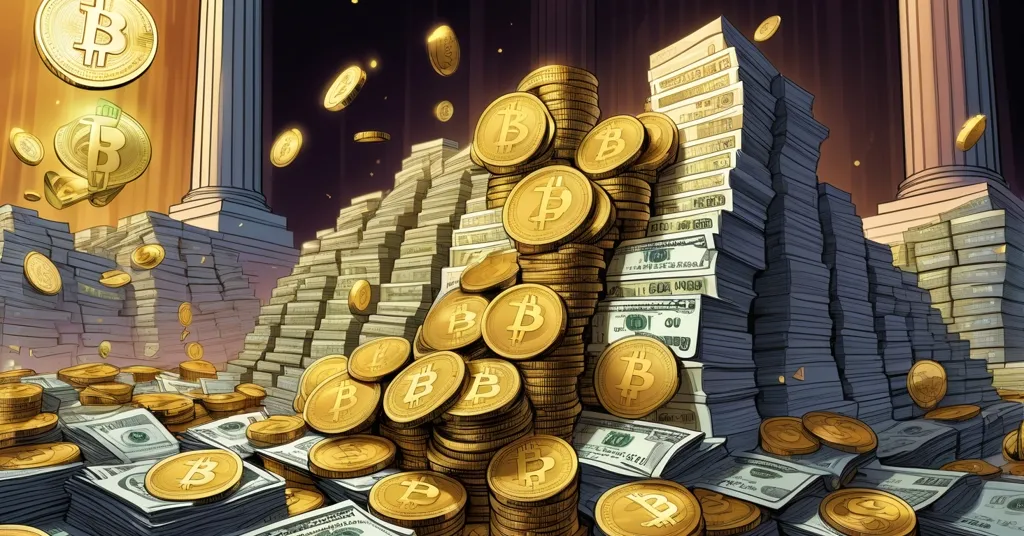Trump’s $3.3T “Big Beautiful Bill” Passes Senate: Crypto Boon or Debt Disaster?

Senate Approves Trump’s “Big Beautiful Bill”: Crypto’s Golden Ticket or Economic Trainwreck?
The U.S. Senate has dropped a financial bombshell by passing a staggering $3.3 trillion spending package, dubbed the “Big Beautiful Bill,” under President Donald Trump’s banner. While it still needs a nod from the House to become law, this legislation is already stirring the crypto pot with promises of tax breaks and regulatory ease, even as it raises red flags about ballooning national debt and inflation. Buckle up, Bitcoiners—this could be a game-changer or a disaster waiting to happen.
- Legislative Giant: $3.3 trillion bill passes Senate, awaits House approval.
- Crypto Perks: Potential tax deferrals, staking/mining relief, and small transaction exemptions.
- Economic Alarm: Massive debt and inflation risks threaten broader market stability.
Crypto-Friendly Provisions: A Win for Decentralization?
Let’s cut to the chase: the crypto community is hyped, and for good reason. Though the official text isn’t fully public yet, reports suggest the bill includes measures that could make Bitcoin and altcoins more accessible than ever. Think tax deferrals on crypto gains—meaning you could reinvest profits without the IRS taking a bite right away. There’s also talk of simplified rules for staking (locking up coins to support a blockchain network for rewards) and mining (the energy-hungry process of validating transactions), potentially sparing small operators the headache of Byzantine tax codes. Perhaps most exciting is a rumored de minimis exemption for transactions under $300. Picture this: buying a $10 lunch with Bitcoin without triggering a taxable event. That’s the kind of frictionless adoption we’ve been craving.
If these provisions hold true, they could lower barriers for everyday users and small-scale players, aligning with our ethos of decentralization and individual empowerment. Platforms like Santiment have noted a “clear bullish bias” in crypto markets since the Senate’s approval, hinting that Bitcoin miners, in particular, could thrive as inflationary pressures boost BTC’s appeal as a store of value. For those new to the space, Bitcoin’s often called “digital gold” because its fixed supply—21 million coins ever—contrasts with fiat currencies that governments can print endlessly. This bill might just supercharge that narrative, as discussed in recent economic impact analyses on cryptocurrency.
But let’s not get carried away with unconfirmed hype. Until we see the fine print, these perks remain speculative. And even if they materialize, there’s a flip side: tax deferrals could fuel speculative bubbles if investors over-leverage without a clear exit strategy. We’re all for disrupting the status quo, but not at the cost of reckless gambling. Stay sharp, HODLers.
Economic Fallout: A Debt Bomb Waiting to Detonate?
Now for the ugly truth. This bill isn’t just a crypto candy store—it’s a fiscal Frankenstein. The Senate passed it on a razor-thin 50-50 vote, with Vice President JD Vance breaking the tie, but the numbers behind it are downright terrifying. The Congressional Budget Office (CBO) projects an additional $3 trillion to the federal deficit over the next decade due to $4.5 trillion in tax cuts and $1.2 trillion in entitlement cuts (think reductions to programs like Medicare) with no revenue offsets (ways to pay for it). That’s enough red ink to make even a Bitcoin maximalist question the sanity of fiat systems, as explored in detailed reports on the bill’s provisions.
Why does this matter to crypto? When governments spend without restraint, inflation often follows as the value of fiat—like the U.S. dollar—erodes. Historically, such moments have driven interest in Bitcoin as a hedge against currency debasement, much like after the 2008 financial crisis when endless money printing sparked BTC’s rise. But here’s the rub: inflation fears could prompt the Federal Reserve to hike interest rates, tightening liquidity and spooking risk assets—including cryptocurrencies. Fed Chair Jerome Powell’s recent “wait-and-see” stance, coupled with Trump’s public attacks calling him “stupid” and a “political guy,” only adds to the uncertainty. If the Fed clamps down, institutional investors might shy away from crypto, even as retail enthusiasts pile in, a sentiment echoed in market reactions to Fed policies.
Market reactions post-vote reflect this tension. Bitcoin dipped 1.5% to $106,000, Ethereum followed suit to $2,430, and Solana took a nastier hit, sliding 6% to $147. XRP held steady at $2.19, but the total crypto market cap shed 3.5% to $3.38 trillion, with $219 million in liquidations across major coins. Short-term pain aside, some analysts like Marius foresee gains for Ethereum and infrastructure-focused altcoins if risk-on sentiment returns. Meme coins and speculative tokens? Don’t hold your breath—those might be left eating dust.
Bitcoin as Inflation Hedge: Digital Gold or Digital Gamble?
As champions of financial sovereignty, we’re rooting for Bitcoin to shine amidst fiat chaos. Its capped supply and decentralized nature make it a compelling alternative when trust in central banks wanes. Yet, we must face harsh realities. Skeptics on platforms like Reddit argue BTC isn’t the safe haven we hype it to be—more a leveraged bet on stock market euphoria, a perspective shared in community discussions on BTC’s role as an inflation hedge. Look at 2022: when equities tanked, Bitcoin plummeted alongside them, not soared as “digital gold” should. If economic fallout from this bill triggers a broader market crash, don’t expect BTC to be your lifeboat. It’s a sobering counterpoint to our optimism, and one worth chewing on as debt piles up, especially when considering national debt’s potential influence on Bitcoin’s value.
Still, with fiat under pressure, the allure of a borderless, censorship-resistant asset remains strong. Sustained inflows into U.S. spot Bitcoin ETFs ($102 million) and Ethereum ETFs ($32 million) as of late June signal underlying institutional interest, even if big players hesitate amid Fed uncertainty. Bitcoin’s narrative might not be bulletproof, but it’s far from dead.
Altcoins in the Mix: Ethereum’s Edge and Solana’s Struggle
Beyond Bitcoin, altcoins like Ethereum could ride a wave of risk appetite if the bill’s economic ripples favor growth over caution. ETH, the backbone of decentralized apps and smart contracts—think of it as the internet for blockchain, powering DeFi and NFTs—benefits from staking post its Merge to proof-of-stake. Simplified tax rules could turbocharge its ecosystem, drawing more users to lock up coins for rewards. Analysts like Marius predict infrastructure-based altcoins will outperform, assuming investors chase higher returns.
Contrast that with Solana, focused on high-speed transactions, which saw a steeper 6% drop post-vote compared to Bitcoin and Ethereum’s 1.5%. Why the disparity? Solana’s often viewed as a high-risk, high-reward play due to its scalability promises, so economic jitters might be shedding speculative holders faster. Other altcoins like Cardano or Polkadot, also infrastructure-driven, could face similar volatility if debt fears dominate. For altcoin enthusiasts, this bill is a double-edged sword—potential policy wins versus market unease, a tension unpacked in analyses of the bill’s crypto implications.
House Vote and Political Wildcards: Will It Even Pass?
The final hurdle is the House of Representatives, and it’s anyone’s guess if they’ll greenlight this beast. Failure to pass means those tantalizing crypto provisions could vanish faster than a shady ICO. Even if it succeeds, long-term economic damage from unchecked spending might eclipse short-term digital asset gains. Then there’s the political circus—Trump’s polarizing influence could sway votes or deepen division, as highlighted in coverage of the Senate’s passage of Trump’s bill. Tech billionaire Elon Musk has reportedly grumbled about the legislation, though specifics are murky. His sway over market sentiment, especially in crypto, adds another unpredictable layer.
Let’s not forget the broader implications. Beyond finance, simplified blockchain rules could spur innovation in supply chains or identity verification, reinforcing our belief in decentralized tech’s power to disrupt. But economic instability is a ruthless foe—no amount of blockchain wizardry insulates us fully from a debt-driven meltdown. As “Crypto Dad” put it, this bill offers a “significant boost” to our sector if progressive elements survive. We’ll believe it when we see it, and ongoing Reddit discussions on crypto tax breaks reflect similar cautious optimism. For a deeper dive into the legislation itself, check out this comprehensive overview of the bill.
Key Takeaways and Questions for Crypto Enthusiasts
- What’s the “Big Beautiful Bill” and why should crypto fans care?
It’s a $3.3 trillion spending package passed by the U.S. Senate under Trump, pending House approval, with rumored crypto-friendly measures like tax deferrals and exemptions for transactions under $300 that could ease adoption. - Can Bitcoin truly be an inflation hedge with this bill’s economic impact?
Possibly, as rising national debt fuels fiat debasement fears, though critics highlight BTC’s correlation with stock market volatility, questioning its safe-haven status. - Will Ethereum and altcoins benefit if the bill passes?
Ethereum and infrastructure altcoins might rally on risk-on sentiment, but speculative tokens could lag if economic uncertainty keeps investors cautious. - Why are institutional investors hesitant despite market buzz?
Uncertainty around Federal Reserve rate hikes and a projected $3 trillion deficit spike, plus political tensions, make big players wary of diving into crypto. - What’s at stake for crypto if the House rejects this legislation?
Rejection could kill the speculated progressive provisions, stalling regulatory clarity and dampening market optimism for digital assets in the near term. - How might economic fallout impact crypto adoption long-term?
Ballooning debt and potential inflation could erode trust in fiat, boosting crypto’s appeal, but market crashes or Fed tightening might scare off new users.
So, where does this leave us? The “Big Beautiful Bill” is a high-stakes gamble for crypto. We’re cautiously optimistic at Let’s Talk, Bitcoin, cheering for policies that empower individuals over centralized overlords with tax relief and regulatory clarity. Yet, we’re not blind to the abyss—economic wreckage from unchecked spending could drag even the toughest blockchains down. Keep your eyes on the House vote, your funds in cold storage, and your skepticism sharper than a Satoshi whitepaper. This isn’t just a bill; it’s a battleground for the future of money. Let’s see who wins.



